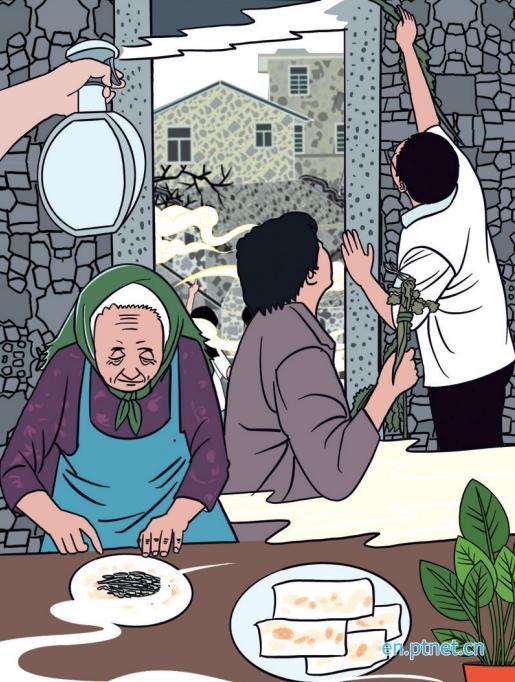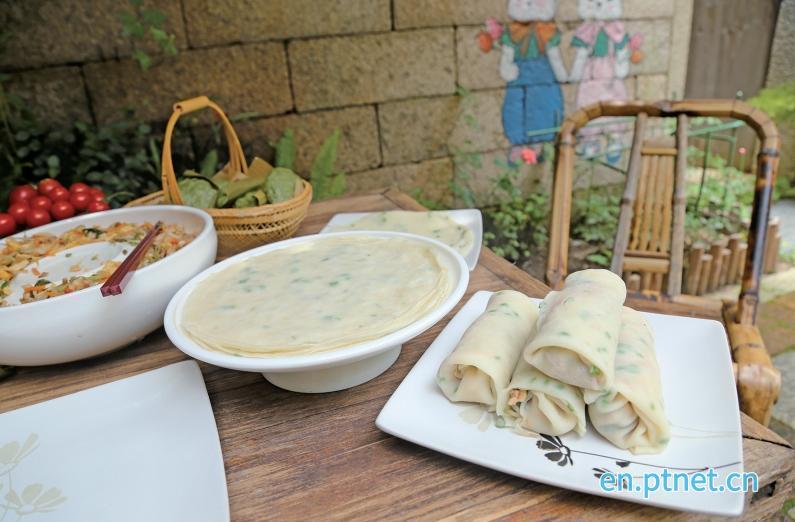Pingtan celebrates the Dragon Boat Festival with five days of unique island traditions
en.ptnet.cn | Updated:2025-05-30 | Lin KongboPingtan, located off the coast of Fujian province and the closest place on the Chinese mainland to the island of Taiwan, is a comprehensive pilot zone dedicated to cross-Straits integration. As China's second international tourism island after Hainan, Pingtan preserves a rich heritage of folk customs that come alive during traditional festivals—especially the Dragon Boat Festival.
While most regions in China mark the festival on the fifth day of the fifth lunar month, Pingtan observes a distinct "Five-Day Festival" or wu ri jie, celebrating from the first to the fifth day. Each day has its own customs, steeped in centuries-old local wisdom. Among the most distinctive is the tradition of making savory pancakes in place of sticky rice dumplings.
Rhymes and Rituals of an Island Festival

Pingtan's Dragon Boat Festival by Zhao Shuhe
A traditional children's rhyme still recited in local dialects reflects the daily rituals:
On the first, hang calamus;
On the second, soak bamboo leaves;
On the third, fry pancakes;
On the fourth, honor the spirits;
On the fifth, bask at midday.
Day One: Hanging Calamus and Mugwort
"Some villages call this custom dang men qing," said Nian Jiasheng, vice chairman of the Pingtan Writers' Association. "Families bundle calamus and mugwort with red paper and nail them to the doorposts."
These fragrant plants have long been believed to repel pests. Modern studies support this, showing that fresh mugwort leaves contain volatile aromatic oils like eucalyptol and camphor, which disrupt mosquito sensory systems.
Day Two: Making Guo Cakes
Nian also recalled childhood memories of qi jia guo—a type of steamed rice cake traditionally saved for the family's laborers during lean times in the 1960s and 70s.
"My siblings and I would race to grab the bamboo container from our father when he came home," he said. "Even today, I still buy a few during the holidays to share with my family."
Day Three: Frying Pancakes Instead of Wrapping Dumplings

Mian Bing (File photo)
Pingtan's most iconic Dragon Boat Festival delicacy isn't the usual sticky rice dumpling. Instead, locals prepare crispy mian bing—savory pancakes stuffed with seafood.
"Due to limited supplies and rough terrain, glutinous rice was once a luxury here," explained Lai Min, a member of the Pingtan Cultural Heritage Experts Panel. "So people used wheat flour wrappers to hold sautéed oysters, clams, shrimp, and pork. It became our island's own version of a zong zi."
Day Four: Returning Home for Guo Jie Zai
The evening before the main festival is known locally as guo jie zai, a night for remembrance and reunion.
"This day is not only about praying for health," said Nian, "but also about honoring ancestors." Married daughters traditionally return to their parents' homes bearing gifts such as fine noodles, eggs, and seafood—a practice known as fen jie, or "dividing the festival."
Day Five: Midday Sun and Herbal Baths
On the final day, families gather wild herbs such as yellow-flower grass, perilla, and verbena from the fields, then boil them to make cleansing baths. Quilts and clothing are washed and left in the sun to dry.
Adults prepare xiong huang jiu, or realgar wine, believed to ward off evil. "They'd dip their fingers in the wine and dot our foreheads and behind our ears," said Nian. "As kids, we were embarrassed. Only later did we understand—it was their way of blessing us."

 Fujian Public Security Registration Code: 35012802000271
Fujian Public Security Registration Code: 35012802000271